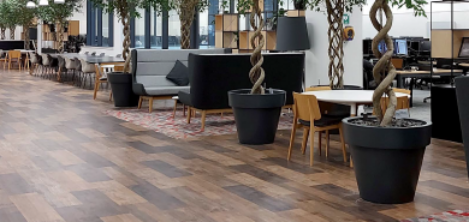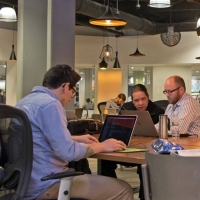March 29, 2023
Leesman partners with MIT Center for Real Estate to explore long term impact of hybrid working
 Workplace analyst Leesman has joined the MIT Center for Real Estate (MIT/CRE) as a Strategic Partner and will be working with its Real Estate Transformation Lab to examine issues related to hybrid working. This collaboration will support Leesman’s three year investigation into the impact of hybrid working on people, places and societies. The Leesman project, entitled ‘The Hybrid Future’, will survey over 10,000 participants from around the world, to explore the impact of hybrid working on everything from productivity, diversity and urban centres to the environment, wellbeing and even our love lives. With 24 surveys set to be issued every six weeks, the volume and diversity of data, length of study, and breadth of topic range, make The Hybrid Future the most comprehensive study of hybrid working ever conducted. (more…)
Workplace analyst Leesman has joined the MIT Center for Real Estate (MIT/CRE) as a Strategic Partner and will be working with its Real Estate Transformation Lab to examine issues related to hybrid working. This collaboration will support Leesman’s three year investigation into the impact of hybrid working on people, places and societies. The Leesman project, entitled ‘The Hybrid Future’, will survey over 10,000 participants from around the world, to explore the impact of hybrid working on everything from productivity, diversity and urban centres to the environment, wellbeing and even our love lives. With 24 surveys set to be issued every six weeks, the volume and diversity of data, length of study, and breadth of topic range, make The Hybrid Future the most comprehensive study of hybrid working ever conducted. (more…)









 A new study claims that hybrid working is leading to a healthier workforce, with more time being dedicated to exercise, sleep and healthy eating. Research among more than 2,000 hybrid workers by IWG suggests that the time saved by reduced commuting has led to multiple health and wellbeing benefits including weight loss, better cooking habits, improved mental health and a longer night’s sleep.
A new study claims that hybrid working is leading to a healthier workforce, with more time being dedicated to exercise, sleep and healthy eating. Research among more than 2,000 hybrid workers by IWG suggests that the time saved by reduced commuting has led to multiple health and wellbeing benefits including weight loss, better cooking habits, improved mental health and a longer night’s sleep. 










 A poll from the latest
A poll from the latest 









January 4, 2023
What IS hybrid working?
by Neil Usher • Comment, Flexible working